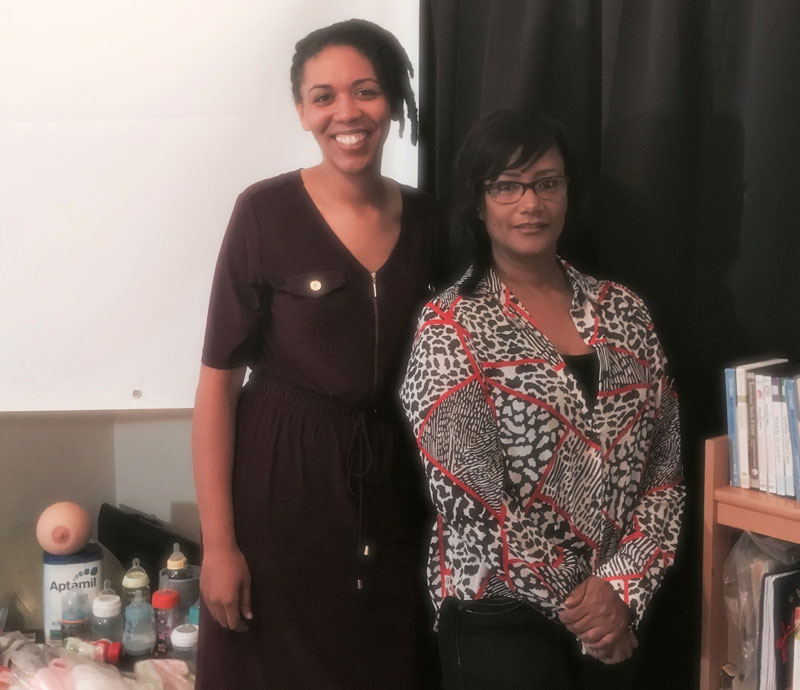Importance Of Early Childhood Development
Two local early childhood educators have issued a ‘call to action’ for the community to reduce focusing so much on material possessions for their children and start investing more in developmental activities.
The plea comes from Allison Figureido, the owner and director of BSmart Foundation, and Calvina Simons, a local newborn care specialist, whom spoke up in honor of Universal Children’s Day, recognized each year on November 20.
Both women say early childhood development is crucial to building a foundation for future learning, happiness, health and overall functioning for each child as they grow, however, they have found it difficult to convince parents of the value of their respective services and activities.
“On a whole, I wish those early years were a more talked about and appreciated time in a child’s life, where those having, caring and providing for children were actively seeking what is best for that child,” Ms Simons said.
“I don’t think early childhood education is seen as vital, just from some of the conversations you hear and where emphasis is placed in terms of resources in our community.
“The importance is placed more so on material items like the price of childcare, activities to do with children/playdates, not necessarily something enriching and what’s developmentally appropriate for each child.”
Knowing developmental milestones – the normal time span for babies and toddlers to crawl, walk, talk and develop other fine and gross motor skills –is key to their development, the women say. Spotting delays and having them appropriately diagnosed early, can allow for any issues to be corrected and boost the child’s development overall.
Mrs Figureido, a long-time educator and expert in child neurodevelopment, stated: “My hope for Universal Children’s Day is that more people would begin to understand the importance that needs to be placed on the early education and care of our children. All kids, no matter what their background, need the right stimuli and tools to encourage growth and the right development – be it emotionally, physically and mentally.
“I’m still surprised when parents are unaware of the potential dangers and knock-on effects later in life from ignoring these crucial years from age 0-5, especially with so much information readily available online today. That’s why I think it’s so vital to educate parents and teachers and provide them with necessary support so they can provide their little ones the best chance at success.”
Mrs Figureido said it was amazing the numbers of small children she’s seen with their own iPads, but she warns interaction with these technologies don’t help with the development of 3D vision.
“Babies and toddlers need real life interaction and activities to help them develop proper depth perception,” she explained. “Even those games touted as educational, aren’t necessarily developmental and should be moderated by an adult.”
“Sometimes parents find it easier to hand over the iPad to stop the child’s meltdown, rather than addressing the behavior at the root of the problem, but it can lead to more issues in the long run,” according to Mrs Figureido.
Ms Simons said there is often pressure for parents to try to figure things out on their own, however the Island has a wealth of professionals and resources to help and guide them in their important role.
She asked: “Why do we feel at such a crucial and sensitive time in our children’s development that it’s okay to not be informed? But, when problems arise or there are delays, which could’ve had intervention earlier, or in some cases when the parent is all out of other options, they finally seek help or look for information.
“It’s backwards! It just doesn’t add up to me. As a society, we are way too reactive versus preventive when it comes to our children. My hope for babies and toddlers is that they would be given the freedom to explore, use all their senses, have healthy attachments/relationships with an adult, receive lots of love and know they are valued.
“My hope would also be that as adults, we cared enough about these littles ones to make ourselves aware of what will help them to become the best version of themselves.”
Mrs. Figureido has worked with children since 1995. After teaching at Heron Bay Primary for more than 15 years, she decided to open B-Smart in January 2011, offering everything from cognitive tutoring, infant and toddler curriculums and developmental after-school programmes.
She stated: “If we don’t address developmental delays on the front end, then they end up becoming issues years later. You see it in young people who are seven or eight-years-old and don’t know how to read. In many cases those young people show early signs of learning and attention issues and if we can address it sooner they have an opportunity to catch up.”
For more information on tools and resources available for early childhood development, visit bsmartfoundation.org or e-mail ncs.bda@gmail.com.



Priorities are all messed up on this island. Children should have love at an early age and not materialistic things. Not the latest talking ELMO but LOVE! Later on they become spoiled kids and a want want want society. He has a nice chain, I want it and I’ll take it. No love from mommy cause she’s too busy working and daddy don’t care. NO LOVE! Young adults with cold hearts and no outlook on life except for FALSE LOVE hanging with my crew in a gang. Guess what, your crew ain’t spending time with you when yah caught and LOCKED UP!